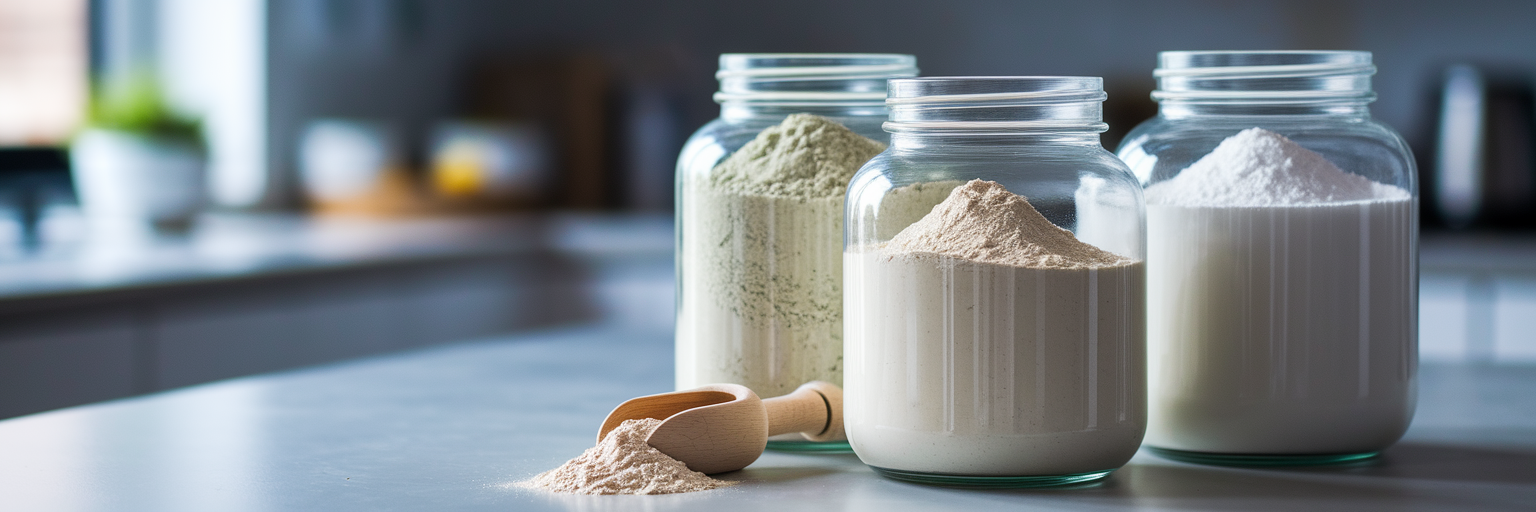Why Your Protein Powder Might Be Upsetting Your Stomach
We’ve all been there. You finish a great workout, mix up a protein shake to refuel, and then it hits you: that uncomfortable bloating, gas, and general digestive unease. It’s a frustrating feeling, especially when you’re trying to do something good for your body. If this sounds familiar, you’re not alone, and the good news is that your protein powder itself might not be the problem.
Many people switch to vegan options to avoid dairy-based proteins like whey and casein, which can be tough on those with lactose sensitivity. But sometimes, the discomfort continues. The real culprits are often the extra ingredients hiding in the formula. A vegan protein for sensitive stomach issues is one that avoids these common irritants.
Here are a few things that could be causing trouble:
- High-FODMAP Ingredients: FODMAPs are short-chain carbohydrates that are hard for some people to digest. They ferment in the gut, leading to gas and bloating. Certain legume-based proteins can contain them.
- Artificial Sweeteners & Sugar Alcohols: Ingredients like sucralose, aspartame, erythritol, and xylitol are common in protein powders. While they cut down on sugar, they can cause significant digestive upset for sensitive individuals.
- Thickeners and Gums: Additives like xanthan gum or carrageenan are used to create a smooth texture, but they can also be difficult for some stomachs to process, leading to discomfort.
Recognizing these potential triggers is the first step. The rest of this guide will walk you through how to find a gentle, effective protein that supports your goals without the digestive drama. You can absolutely get the protein you need and feel great doing it.
Key Features of a Gut-Friendly Vegan Protein

Now that we know what to avoid, let's focus on what to look for. Finding an easy to digest protein powder is all about becoming a savvy label reader. The right product will have a few key characteristics that signal it’s designed with your digestive wellness in mind.
Focus on Simple, High-Quality Protein Sources
Instead of complex blends with dozens of ingredients, look for powders that use one or two high-quality protein sources. Pea, brown rice, and hemp proteins are excellent choices because they are naturally hypoallergenic and gentle on the stomach. Specifically, protein "isolates" are often the best bet. The isolation process removes most of the starches and fibers from the plant, leaving behind pure protein that is much easier for your body to break down and absorb. To get a full picture of what makes a quality supplement, you can review some of the insights we shared on the best protein powders.
Look for a Clean and Minimal Ingredient List
Think of it this way: the shorter the ingredient list, the better. When you see a list filled with recognizable, whole-food-based components, it’s a great sign. This aligns with the growing desire for less processed foods. If you can’t pronounce half the ingredients, it might be a red flag for your digestive system. A clean label means the brand isn't hiding behind unnecessary fillers or additives.
Consider Added Digestive Support
Some of the best formulas go a step further by including ingredients that actively support digestion. Look for digestive enzymes like protease, which helps break down protein molecules, making them easier for your body to use. Probiotics and prebiotics are also fantastic additions, as they help nourish the healthy bacteria in your gut, contributing to overall digestive balance.
Check for Third-Party Certifications
Certifications are a powerful trust signal. They show that a brand has gone the extra mile to verify its claims. For those with sensitivities, labels like "Low FODMAP Certified," "Certified Gluten-Free," and "Soy-Free" are incredibly helpful. A low FODMAP protein powder, for example, has been lab-tested to ensure it won’t trigger symptoms associated with those fermentable carbs.
| Protein Source | Key Benefit | Digestibility Factor | Best For |
|---|---|---|---|
| Pea Protein Isolate | High in BCAAs, hypoallergenic | Most fiber and starch removed | Athletes needing muscle support |
| Brown Rice Protein | Extremely gentle, hypoallergenic | Naturally low in allergens and irritants | Those with multiple food sensitivities |
| Hemp Protein | Rich in fiber, omegas, and minerals | Contains natural fiber which can aid some, but may affect others | Individuals seeking a 'whole food' protein source |
This table provides a quick comparison of the most common gentle vegan protein sources. The choice often depends on individual goals, whether it's maximizing muscle repair or finding the most hypoallergenic option.
Top Plant-Based Proteins for Digestive Health in 2025
With a clear idea of what to look for, let's explore the best protein sources that are celebrated for being gentle on the gut. These are the options that consistently deliver results without the unwanted side effects.
- Pea Protein: This is a true powerhouse for muscle support, thanks to its impressive branched-chain amino acid (BCAA) profile. For digestive ease, always opt for pea protein isolate. This form has had most of the fiber and starches removed, leaving a smooth, highly digestible protein that’s also naturally free of common allergens.
- Brown Rice Protein: If you have a particularly sensitive system, brown rice protein is often the top recommendation. It’s incredibly gentle and hypoallergenic, making it a safe bet for almost everyone. While its amino acid profile is solid, it pairs perfectly with pea protein to create a complete protein source that covers all your bases.
- Hemp Protein: For those who want a more "whole food" approach, hemp is a fantastic choice. It’s not just a protein source; it’s also packed with healthy omega-3 fats, minerals, and fiber. It's important to have a balanced view here: the natural fiber can be great for some digestive systems, but if you're highly sensitive to fiber, it’s wise to start with a smaller serving to see how your body responds.
As we look at the best plant based protein 2025 has to offer, a clear trend is emerging: brands are finally listening to consumers who demand a non bloating vegan protein. As publications like Forbes have highlighted, there's a significant market shift toward formulas that prioritize digestive wellness. Some brands are leading this charge by focusing on simple, effective formulas. The Beyond Good Foods Chocolate Vegan Protein, for example, uses a straightforward blend of pea and rice protein to deliver results without the common additives that cause discomfort.
How to Add Vegan Protein Powder to Your Diet Without Discomfort

Finding the right powder is half the battle; the other half is knowing how to use protein powder in a way that supports your digestion. Even the gentlest formula can cause issues if not introduced correctly. Here are a few simple, practical tips to make your protein routine a success.
- Start Low and Go Slow: Don't jump in with a full scoop on day one. Start with a half-scoop mixed with plenty of liquid. This gives your digestive system a chance to adapt to the new supplement, significantly reducing the risk of bloating or discomfort. After a week, you can gradually increase to a full serving.
- Blend It Better: A shaker cup is convenient, but a blender is your gut’s best friend. Blending the powder for 30-60 seconds breaks it down more thoroughly, creating a smoother, less dense consistency that is easier to digest. Stick to simple, gut-friendly liquids like water or unsweetened almond milk.
- Create a Gentle Smoothie: Your smoothie ingredients matter. Pair your protein powder with low-FODMAP fruits like blueberries or strawberries, a handful of spinach for extra nutrients, and a touch of fresh ginger, which is well-known for its stomach-soothing properties. This creates a delicious and easily digestible meal or snack.
- Think Beyond the Shake: Protein powder is more versatile than you think! Stirring a scoop into your morning oatmeal or a bowl of non-dairy yogurt is a great way to boost your protein intake without chugging a shake. You can also add it to baking recipes. For more ideas, you can find inspiration in some of the easy vegan protein recipes we've created.
Finding Your Perfect Match by Listening to Your Body
You are now equipped with the knowledge to find a protein powder that fuels your body and respects your gut. The key takeaways are simple: choose straightforward protein sources like pea and rice, become a detective and read labels for minimal ingredients, and consider formulas with added digestive support.
Ultimately, every digestive system is unique. What works perfectly for one person might not be the ideal fit for another. This is a personal journey of observation and adjustment. Be patient with yourself and pay attention to the signals your body sends. Finding the right product isn’t about chasing a "perfect" solution, but about discovering what makes you feel your best.
Feel free to explore some of the options with these features in our full collection and listen to what your body tells you. Have a favorite gut-friendly tip or a success story? Share it in the comments below!



